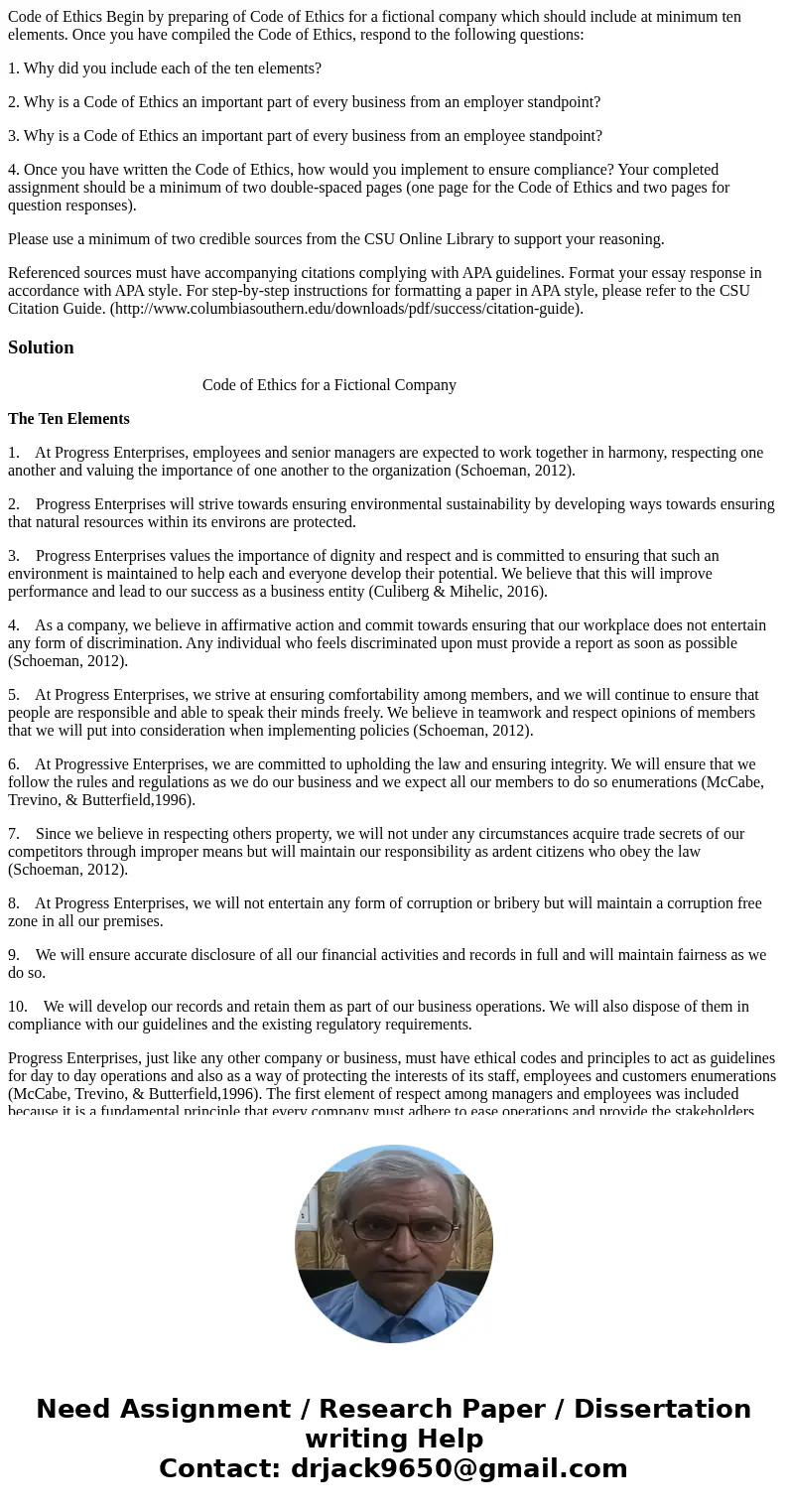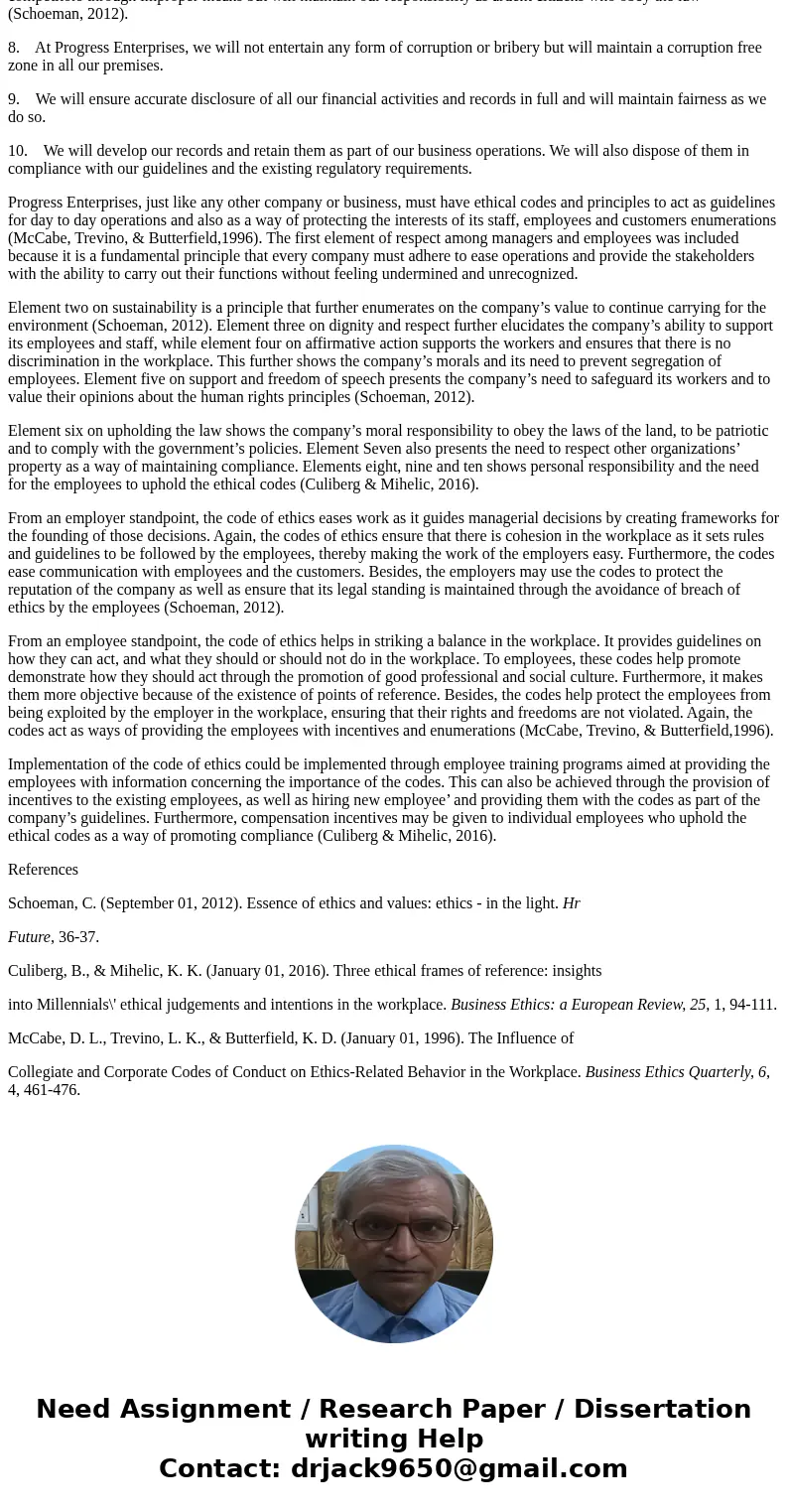Code of Ethics Begin by preparing of Code of Ethics for a fi
Code of Ethics Begin by preparing of Code of Ethics for a fictional company which should include at minimum ten elements. Once you have compiled the Code of Ethics, respond to the following questions:
1. Why did you include each of the ten elements?
2. Why is a Code of Ethics an important part of every business from an employer standpoint?
3. Why is a Code of Ethics an important part of every business from an employee standpoint?
4. Once you have written the Code of Ethics, how would you implement to ensure compliance? Your completed assignment should be a minimum of two double-spaced pages (one page for the Code of Ethics and two pages for question responses).
Please use a minimum of two credible sources from the CSU Online Library to support your reasoning.
Referenced sources must have accompanying citations complying with APA guidelines. Format your essay response in accordance with APA style. For step-by-step instructions for formatting a paper in APA style, please refer to the CSU Citation Guide. (http://www.columbiasouthern.edu/downloads/pdf/success/citation-guide).
Solution
Code of Ethics for a Fictional Company
The Ten Elements
1. At Progress Enterprises, employees and senior managers are expected to work together in harmony, respecting one another and valuing the importance of one another to the organization (Schoeman, 2012).
2. Progress Enterprises will strive towards ensuring environmental sustainability by developing ways towards ensuring that natural resources within its environs are protected.
3. Progress Enterprises values the importance of dignity and respect and is committed to ensuring that such an environment is maintained to help each and everyone develop their potential. We believe that this will improve performance and lead to our success as a business entity (Culiberg & Mihelic, 2016).
4. As a company, we believe in affirmative action and commit towards ensuring that our workplace does not entertain any form of discrimination. Any individual who feels discriminated upon must provide a report as soon as possible (Schoeman, 2012).
5. At Progress Enterprises, we strive at ensuring comfortability among members, and we will continue to ensure that people are responsible and able to speak their minds freely. We believe in teamwork and respect opinions of members that we will put into consideration when implementing policies (Schoeman, 2012).
6. At Progressive Enterprises, we are committed to upholding the law and ensuring integrity. We will ensure that we follow the rules and regulations as we do our business and we expect all our members to do so enumerations (McCabe, Trevino, & Butterfield,1996).
7. Since we believe in respecting others property, we will not under any circumstances acquire trade secrets of our competitors through improper means but will maintain our responsibility as ardent citizens who obey the law (Schoeman, 2012).
8. At Progress Enterprises, we will not entertain any form of corruption or bribery but will maintain a corruption free zone in all our premises.
9. We will ensure accurate disclosure of all our financial activities and records in full and will maintain fairness as we do so.
10. We will develop our records and retain them as part of our business operations. We will also dispose of them in compliance with our guidelines and the existing regulatory requirements.
Progress Enterprises, just like any other company or business, must have ethical codes and principles to act as guidelines for day to day operations and also as a way of protecting the interests of its staff, employees and customers enumerations (McCabe, Trevino, & Butterfield,1996). The first element of respect among managers and employees was included because it is a fundamental principle that every company must adhere to ease operations and provide the stakeholders with the ability to carry out their functions without feeling undermined and unrecognized.
Element two on sustainability is a principle that further enumerates on the company’s value to continue carrying for the environment (Schoeman, 2012). Element three on dignity and respect further elucidates the company’s ability to support its employees and staff, while element four on affirmative action supports the workers and ensures that there is no discrimination in the workplace. This further shows the company’s morals and its need to prevent segregation of employees. Element five on support and freedom of speech presents the company’s need to safeguard its workers and to value their opinions about the human rights principles (Schoeman, 2012).
Element six on upholding the law shows the company’s moral responsibility to obey the laws of the land, to be patriotic and to comply with the government’s policies. Element Seven also presents the need to respect other organizations’ property as a way of maintaining compliance. Elements eight, nine and ten shows personal responsibility and the need for the employees to uphold the ethical codes (Culiberg & Mihelic, 2016).
From an employer standpoint, the code of ethics eases work as it guides managerial decisions by creating frameworks for the founding of those decisions. Again, the codes of ethics ensure that there is cohesion in the workplace as it sets rules and guidelines to be followed by the employees, thereby making the work of the employers easy. Furthermore, the codes ease communication with employees and the customers. Besides, the employers may use the codes to protect the reputation of the company as well as ensure that its legal standing is maintained through the avoidance of breach of ethics by the employees (Schoeman, 2012).
From an employee standpoint, the code of ethics helps in striking a balance in the workplace. It provides guidelines on how they can act, and what they should or should not do in the workplace. To employees, these codes help promote demonstrate how they should act through the promotion of good professional and social culture. Furthermore, it makes them more objective because of the existence of points of reference. Besides, the codes help protect the employees from being exploited by the employer in the workplace, ensuring that their rights and freedoms are not violated. Again, the codes act as ways of providing the employees with incentives and enumerations (McCabe, Trevino, & Butterfield,1996).
Implementation of the code of ethics could be implemented through employee training programs aimed at providing the employees with information concerning the importance of the codes. This can also be achieved through the provision of incentives to the existing employees, as well as hiring new employee’ and providing them with the codes as part of the company’s guidelines. Furthermore, compensation incentives may be given to individual employees who uphold the ethical codes as a way of promoting compliance (Culiberg & Mihelic, 2016).
References
Schoeman, C. (September 01, 2012). Essence of ethics and values: ethics - in the light. Hr
Future, 36-37.
Culiberg, B., & Mihelic, K. K. (January 01, 2016). Three ethical frames of reference: insights
into Millennials\' ethical judgements and intentions in the workplace. Business Ethics: a European Review, 25, 1, 94-111.
McCabe, D. L., Trevino, L. K., & Butterfield, K. D. (January 01, 1996). The Influence of
Collegiate and Corporate Codes of Conduct on Ethics-Related Behavior in the Workplace. Business Ethics Quarterly, 6, 4, 461-476.


 Homework Sourse
Homework Sourse